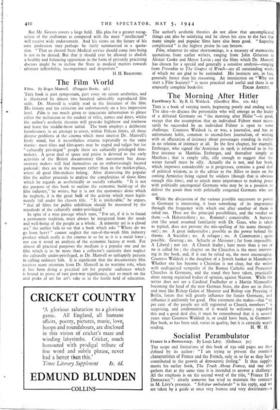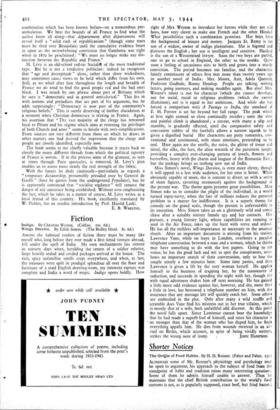Socialist Perambulator
France is a Democracy. By Louis Levy. (Gollancz. 58.) THE scope and limitations of this book of 150 odd pages are thus defined by its author: "I am trying to present the essential characteristics of France and the French, only in so far as they have contributed to the growth of democratic feeling." It thus supple- ments his earlier book, The Truth About France, and one also gathers that at the same time it is intended to answer a challenge. All the emphasis is on the second word' of the title, "France IS a Democracy": clearly someone has tried to maintain the contrary in M. Levy's presence. "Solvitur ambulando" is his reply, and we are taken by a guide at once very human and very doctrinaire—a combination which has been known before—on a tremendous per- ambulation. We beat the bounds of all France to find what the author knew all along—that departement after departement will reveal itself a "solid rock of republicanism." (though. some tears must be shed over Beaujolais) until the cumulative evidence bears in upon us the overwhelming conviction that Gambetta was right when in 1870 he proclaimed : "We must no longer make any dis- tinction between the Republic and France."
M. Levy is an old-school red-tie Socialift of the most traditional type. But he is not a vindictive politician: indeed he recognises that "age and decrepitude" alone, rather than sheer wickedness, may sometimes cause views to be held which differ from his own. Still, as we whirl after him throughout the length and breadth of France we do tend to find the good people red and the bad ones black. I was struck by one phrase about part of Brittany which _he says is "democratic and in general anti-clerical." This fits in with notions and prejudices that are part of his argument, but he adds surprisingly : "Democracy is now part of the community's religious beliefs." This is surely deserving of further elucidation at a moment when Christian democracy is stirring in France. Again, his assertion that "The vast majority of the clergy has remained loyal to Petain and his regime which aims at restoring the privileges of both Church and army" seems to bristle with over-simplifications. From sources not very different from those on which he draws in other matters one had derived the impression that the clergy and people are closely identified, especially now.
The book seems to me chiefly valuable because it traces back so closely the many different threads from which the political tapestry of France is woven. If in the process some of the glamour, as seen at times through Paris spectacles, is removed, M. Levy's plan enables us to assess more nearly the real strength of the fabric.
With the future he deals cautiously—particularly as regards a "temporary dictatorship, presumably presided over by General de Gaulle" (here he quotes from the underground Populaire), but he is apparently convinced that "socialist vigilance" will remove the danger of any autocracy being established. Without over-emphasising the fact, which he takes as a matter of course, M. Levy writes as a loyal friend of this country. His book, excellently translated by W. Pickles, has an erudite introduction by Prof. Harold Laski.
E. B. WAREING.























 Previous page
Previous page